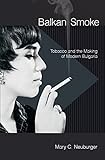Balkan Smoke : Tobacco and the Making of Modern Bulgaria / Mary C. Neuburger.
Material type: TextPublisher: Ithaca, NY : Cornell University Press, [2012]Copyright date: ©2016Description: 1 online resource (320 p.) : 15 halftones, 1 mapContent type:
TextPublisher: Ithaca, NY : Cornell University Press, [2012]Copyright date: ©2016Description: 1 online resource (320 p.) : 15 halftones, 1 mapContent type: - 9780801465949
- Smoking -- Social aspects -- History -- 19th century -- Bulgaria
- Smoking -- Social aspects -- History -- 20th century -- Bulgaria -- Bulgaria
- Smoking -- Social aspects -- Bulgaria -- History -- 19th century
- Smoking -- Social aspects -- Bulgaria -- History -- 20th century
- Tobacco industry -- History -- 19th century -- Bulgaria
- Tobacco industry -- History -- 20th century -- Bulgaria
- Tobacco industry -- Bulgaria -- History -- 19th century
- Tobacco industry -- Bulgaria -- History -- 20th century
- Europe
- History
- HISTORY / Europe / Eastern
- smoking culture, tobacco production, eastern european history, tobacco Agribusiness, modern Bulgaria, eastern european studies, balkan studies
- 338.476797309499 23
- HD9145.B9 N48 2016
- online - DeGruyter
| Item type | Current library | Call number | URL | Status | Notes | Barcode | |
|---|---|---|---|---|---|---|---|
 eBook
eBook
|
Biblioteca "Angelicum" Pont. Univ. S.Tommaso d'Aquino Nuvola online | online - DeGruyter (Browse shelf(Opens below)) | Online access | Not for loan (Accesso limitato) | Accesso per gli utenti autorizzati / Access for authorized users | (dgr)9780801465949 |
Browsing Biblioteca "Angelicum" Pont. Univ. S.Tommaso d'Aquino shelves, Shelving location: Nuvola online Close shelf browser (Hides shelf browser)

|

|

|

|

|

|

|
||
| online - DeGruyter The Covert Sphere : Secrecy, Fiction, and the National Security State / | online - DeGruyter Welfare through Work : Conservative Ideas, Partisan Dynamics, and Social Protection in Japan / | online - DeGruyter A Europe Made of Money : The Emergence of the European Monetary System / | online - DeGruyter Balkan Smoke : Tobacco and the Making of Modern Bulgaria / | online - DeGruyter Prosper or Perish : Credit and Fiscal Systems in Rural China / | online - DeGruyter When Small States Make Big Leaps : Institutional Innovation and High-Tech Competition in Western Europe / | online - DeGruyter In the Words of Theodore Roosevelt : Quotations from the Man in the Arena / |
Frontmatter -- Contents -- Acknowledgments -- Introduction -- 1. Coffeehouse Babble: Smoking and Sociability in the Long Nineteenth Century -- 2. No Smoke without Fire: Tobacco and Transformation, 1878–1914 -- 3. From the Orient Express to the Sofia Café: Smoke and Propriety in the Interwar Years -- 4. The Tobacco Fortress: Asenovgrad Krepost and the Politics of Tobacco between the World Wars -- 5. From Leaf to Ash: Jews, Germans, and Bulgarian Gold in the Second World War -- 6. Smoke-Filled Rooms: Places to Light Up in Communist Bulgaria -- 7. Smokes for Big Brother: Bulgartabak and Tobacco under Communism -- Conclusion -- Notes -- Bibliography -- Index
restricted access online access with authorization star
http://purl.org/coar/access_right/c_16ec
This fascinating book explores the history of tobacco and tobacco culture in Bulgaria from the mid-19th century, when the country became partially and then fully independent from the Ottoman Empire, to the postcommunist present. Neuburger. argues convincingly that smoking and the production of tobacco products played an important―if not the key―part in Bulgaria's political, economic; and cultural modernization during this period. Summing Up: Highly recommended. ― ChoiceIn Balkan Smoke, Mary C. Neuburger leads readers along the Bulgarian-Ottoman caravan routes and into the coffeehouses of Istanbul and Sofia. She reveals how a remote country was drawn into global economic networks through tobacco production and consumption and in the process became modern. In writing the life of tobacco in Bulgaria from the late Ottoman period through the years of Communist rule, Neuburger gives us much more than the cultural history of a commodity; she provides a fresh perspective on the genesis of modern Bulgaria itself. The tobacco trade comes to shape most of Bulgaria’s international relations; it drew Bulgaria into its fateful alliance with Nazi Germany and in the postwar period Bulgaria was the primary supplier of smokes (the famed Bulgarian Gold) for the USSR and its satellites. By the late 1960s Bulgaria was the number one exporter of tobacco in the world, with roughly one eighth of its population involved in production.Through the pages of this book we visit the places where tobacco is grown and meet the merchants, the workers, and the peasant growers, most of whom are Muslim by the postwar period. Along the way, we learn how smoking and anti-smoking impulses influenced perceptions of luxury and necessity, questions of novelty, imitation, value, taste, and gender-based respectability. While the scope is often global, Neuburger also explores the politics of tobacco within Bulgaria. Among the book’s surprises are the ways in which conflicts over the tobacco industry (and smoking) help to clarify the forbidding quagmire of Bulgarian politics.
Mode of access: Internet via World Wide Web.
In English.
Description based on online resource; title from PDF title page (publisher's Web site, viewed 26. Apr 2024)


